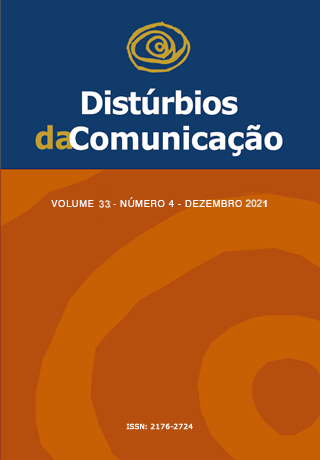From dysphagia to food restriction
effects of parental adaptation to the daughter with congenital blindness
DOI:
https://doi.org/10.23925/2176-2724.2021v33i4p686-694Keywords:
Prematurity, Dysphagia, Blindness, Psychological Adaptation, Interdisciplinary Health TeamAbstract
Introduction: The birth of a child with a disability can change routines and influence the parents’ adaptation process, as it is characterized as an unexpected event. It can still produce similar feelings in parents as those experienced in a grieving process. Objective: To analyze the relationship between parental adaptation to the daughter with congenital blindness and dysphagia, related to extreme prematurity, and its possible impact on the process of adherence to therapeutic guidelines on child nutrition. Method: This is a qualitative case study. An analysis of parental adaptation to disability as well as language therapy assessments of language and dysphagia were performed. Results: The speech therapy evaluation showed dysphagia for fine liquids and absence of language disorders. Dietary restriction became evident from the parental difficulty in accepting and following the guidelines regarding food consistency. The analysis of the parental adaptation data to the daughter’s disability suggests that this difficulty was related to the acceptance of blindness and dysphagia. The emergence of food restriction was related to the difficulties in parents’ acceptance of speech therapy guidelines, considering dysphagia for thin liquids. These difficulties find a correlate in the analysis of the father and mother’s parental adaptation. Conclusion: The importance of monitoring by an interdisciplinary team is evident.
Downloads
References
Rommel N, Meyer AM, Feenstra L, Veereman-Wauters G. The complexity of feeding problems in 700 infants and young children presenting to a tertiary care institution. J Pediatr gastroenterol Nutr., 2003; 37(1): 75-84.
Cunha AJLA, Leite AJM, Almeida IS. The pediatrician’s role in the first thousand days of the child: the pursuit of healthy nutrition and development. J Pediatr., 2015; 91(6): S44-S51.
Bellefeuille B. El rechazo a alimentarse y la selectividad alimentaria en el niño menor de 3 años: una compleja combinación de factores médicos, sensorimotores y conductuales. Acta Pediatr Esp., 2014; 72(5): 92-7.
Pagliaro CL, Bühler KEB, Ibidi SM, Limonge SCO. Dietary transition difficulties in preterm infants: critical literature review. J Pediatr., 2016; 92(1): 7-14.
Yamamoto RCC, Prade LS, Bolzan GP, Weinmann ARM, Keske-Soares M. Readiness for oral feeding and oral motor function in preterm infants. Rev CEFAC, 2017; 19(4): 503-9.
Barbosa LR, Gomes E, Fischer GB. Sinais clínicos de disfagia em lactentes com bronquiolite viral aguda. Rev Paul Pediatr., 2014; 32(3): 157-63.
Edwards S, Davis AM, Bruce A, Mousa, H, Lyman B, Cocjin J et al. Caring for tube-fed children: a review of management, tube weaning and emotional considerations. J parenter enteral nutr., 2016, 40(5): 616-22.
Oliveira IG, Poletto M. Vivências emocionais de mães e pais de filhos com deficiência. Rev da SPAGESP, 2015; 16(2): 102-19.
Franco, V. Adaptação das famílias de crianças com perturbações graves do desenvolvimento – contribuição para um modelo conceptual. INFAD., 2009, XXI (2): 25-36.
Nunes, SS, Lomônaco, JFB. Desenvolvimento de conceitos em cegos congênitos: caminhos de aquisição do conhecimento. Revista Semestral da Associação Brasileira de Psicologia Escolar e Educacional, 12(1), 119-138, 2008.
Franco, V. Tornar-se pai/mãe de uma criança com transtornos graves do desenvolvimento. Educ Rev., 2016; 59: 35-48.
Londero, AD. Validação da Escala de Adaptação Parental ao Filho com Deficiência – EPAD [Tese de Doutorado]. Santa Maria (RS): Universidade Federal de Santa Maria. Programa de Pós-Graduação em Distúrbios da Comunicação Humana, 2019.
Najas, M. I Consenso brasileiro de nutrição e disfagia em idosos hospitalizados. 1 ed. Barueri, SP: Minha Editora, 2011.
Silva, CS, Carneiro M. Adaptation to parenthood: the first childbirth. Rev Enf Ref., 2014; 3:17-27.
Araújo, MAF, Silva RA, Melo ES, Silva MAM, Mazza VA, Freitas CASL. Redes sociais de apoio e famílias de crianças com deficiência: uma revisão integrativa. Atas CIAIQ, 2018, 2: 585-94.
Milbrath, VM, Siqueira, HCH, Motta, MGC, Amestoy, SC. Família da criança com paralisia cerebral: percepção sobre as orientações da equipe de saúde. Rev Texto e Contexto em Enfermagem, 21(4): 921-8.
Mas JM, Baqués N, Balcells-Balcells A, Dalmau M, Giné C, Gràcia, M et al. Family quality of life for families in early intervention in Spain. J Early Interv., 2016, 38(1): 59-74.
Cichero, JAY, Lam, P, Steele, CM, Hanson, B, Chen, J, Dantas, RO et al. Development of international terminology and definitions for texture modified foods and thickened fluids used in dysphagia management: the IDDSI framework. Dysphagia, 32(2): 293-314, 2017.
Downloads
Published
Issue
Section
License
Copyright (c) 2021 Renata Souto Bolzan, Diogo Ribas dos Santos, Angélica Dotto Londero, Ana Paula Ramos de Souza

This work is licensed under a Creative Commons Attribution 4.0 International License.









